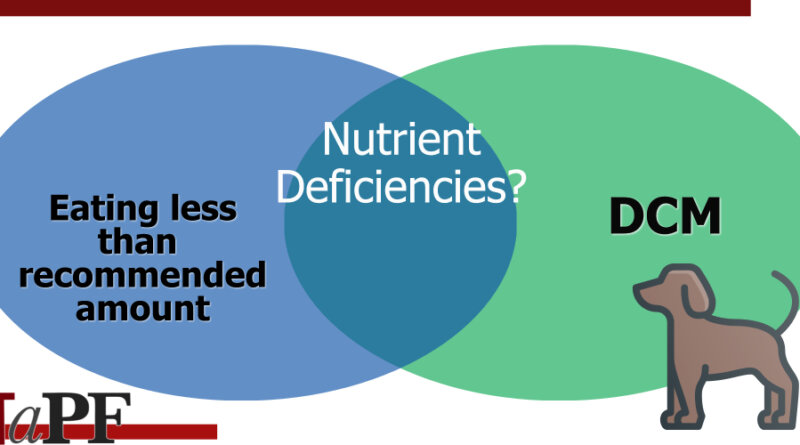What if… AAFCO Nutrient Profiles are Linked to DCM? – Truth about Pet Food
AAFCO Nutrient Profiles – the profiles every US pet food is required to meet (with the claim of Complete and Balanced) – were developed only for the calorie needs of active pets.

As example, per the manufacturer recommended feeding amount, a thirty pound dog would need to consume 3 cups of dog food a day to provide a Complete and Balanced diet.
But what if…

…an inactive thirty pound dog was only eating 2/3 of the amount of pet food required to be complete and balanced…could eating less food result in nutrient deficiencies?
According to multiple research papers, nutrient deficiencies ARE linked to calorie restriction (a dog consuming less food).
“Risk of nutritional deficiencies for dogs on a weight loss plan”
“Several nutrients were found at risk of deficiency, including choline, methionine, cysteine, selenium, eicosapentanoic acid, docosahexanoic acid, riboflavin, pantothenic acid and cobalamin in both non-therapeutic adult maintenance diets and non-therapeutic weight management diets.”
“Intake of energy, protein, amino acids and minerals by dogs under energy restriction for body weight loss when fed with commercial weight loss diets”
“Considering the observed ME intake of each dog, depending on the commercial product, intake below recommended for maintenance was verified for crude protein in 1%–20% of the dogs, methionine in 4%–38% of dogs, methionine plus cystine in 4%–22% of dogs, tryptophan in 7%–93% of dogs, potassium in 2%–85% of dogs and magnesium in 1% up to 95% of dogs. Although the diets presented elevated nutrient concentrations per MJ, due to the reduced energy allowance, the estimated intake of several nutrients was lower than the recommendations, highlighting the importance of changing the formulation perspective, which must prioritize the actual nutrient intake per kg of BW during the energy deficit.”
And…
“Deficiencies of a variety of nutrients, such as thiamine, magnesium, choline, vitamin E and selenium, have been associated with DCM in humans or animal models. Deficiencies of two amino acid or amino acid-related compounds also can cause a nutritional DCM.”
We know that the FDA analyzed the pet foods that were reported to be fed to DCM diagnosed dogs, all pet food tested within AAFCO Nutrient Profile requirements.
But we don’t know how much of that complete and balanced food each diagnosed dog consumed. The FDA adverse event reports – consumer reports to FDA of pet illness/diagnosis – did NOT ask pet owners how much food was fed daily (at least the FOIA acquired reports we received from FDA did not disclose the amount of pet food each dog was consuming).
Does this potential DCM link to pet food deserve an investigation?
We believe it does. And it won’t be easy to urge the FDA to examine this possibility. FDA has ignored our (Dr. Karen Becker, pet food formulator Steve Brown, and myself) multiple attempts to correct AAFCO’s Nutrient Profiles. We proved to the Agency nutrient deficiencies and excesses are a real concern depending on how much food a dog or cat consumes.
But regardless to FDA’s lack of concern to this issue, we sent the following message to the Agency:
Many parties, including the FDA, have investigated a potential cause of the increase of reports of DCM in dogs. However, one potential cause has never been investigated to our knowledge. This message is being sent to request the FDA to investigate a potential link of restricted calorie intake to nutrient deficiencies to DCM linked to AAFCO’s Nutrient Profiles for active dogs. We are directly asking the FDA to investigate if any of the DCM diagnosed dogs were consuming less food than the manufacturer recommended feeding amount.
The paper “Risk of nutritional deficiencies for dogs on a weight loss plan” (2018) stated “Restriction of commercial diets to achieve weight loss in dogs may result in nutrient deficiencies.” Potentially linked to DCM, this research found methionine and cysteine “were at risk of deficiency”.
The paper “Intake of energy, protein, amino acids and minerals by dogs under energy restriction for body weight loss when fed with commercial weight loss diets” (2022) also found deficiencies of nutrients with dogs fed less calories of commercial diets. Findings in this study documented “intake below recommended for maintenance was verified for crude protein, methionine, methionine plus cystine, tryptophan, potassium and magnesium.”
As FDA is aware, Complete and Balanced pet foods in the US are required to meet AAFCO Nutrient Profiles (or complete a feeding trial). And as FDA is aware, the AAFCO Nutrient Profiles are ‘complete and balanced’ based on the caloric needs of active dogs; “Dogs kept in a domestic environment with strong stimulus and ample opportunity to exercise, such as dog households in the country or in a house with a large yard.”
We are concerned IF any of the pets diagnosed with DCM were consuming fewer calories than AAFCO’s Nutrient Profiles allow for a complete and balanced diet potentially resulting in nutrient deficiencies which in turn potentially resulted in their DCM diagnosis. Much to our surprise, the FDA adverse event reports do not disclose the amount of food each DCM diagnosed dog consumed daily.
We are requesting the FDA to fully investigate the potential link of nutrient deficiencies caused by a dog/cat consuming less food (less calories) than AAFCO Nutrient Profiles (for active dogs) require for a complete and balanced diet to DCM in dogs. Many other potential causes have been investigated, the very serious risk of nutrient deficiencies and their link to AAFCO Nutrient Profiles deserve a full investigation as well.
Please provide us with a response if FDA/CVM is going to investigate this issue or ignore this issue.
If your dog was diagnosed with DCM and you fed less pet food than the manufacturer recommended amount (because your dog would become obese if you did) – please report this to the FDA. Email: AskCVM@fda.hhs.gov. If you filed an Adverse Event report with FDA regarding your dog’s DCM diagnosis, please include the report number you were assigned (or date you reported) in your email.
Wishing you and your pet(s) the best,
Susan Thixton
Pet Food Safety Advocate
Author Buyer Beware, Co-Author Dinner PAWsible
TruthaboutPetFood.com
Association for Truth in Pet Food

Become a member of our pet food consumer Association. Association for Truth in Pet Food is a a stakeholder organization representing the voice of pet food consumers at AAFCO and with FDA. Your membership helps representatives attend meetings and voice consumer concerns with regulatory authorities. Click Here to learn more.
What’s in Your Pet’s Food?
Is your dog or cat eating risk ingredients? Chinese imports? Petsumer Report tells the ‘rest of the story’ on over 5,000 cat foods, dog foods, and pet treats. 30 Day Satisfaction Guarantee. Click Here to preview Petsumer Report. www.PetsumerReport.com
Find Healthy Pet Foods in Your Area Click Here

The 2023 List
Susan’s List of trusted pet foods. Click Here to learn more.




